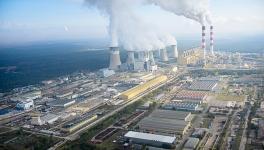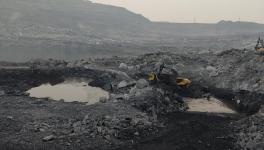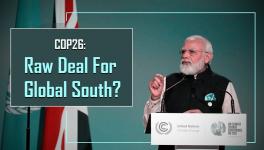Paris Summit: No Solution on Carbon Budget, What After 2030?
Prabir Purkayastha from Newsclick, T.Jayaraman and Tejal Kanitkar from TISS discussed the Paris Climate Summit, the negotiations and the impact. The discussion points out that the Paris Climate Summit provides no concrete proposals on limiting the global rise in temperature. The limit of two Degree Celsius will easily be crossed if the carbon emissions continue at the present rate. Under the current emission rate, half of the carbon budget has already been exhausted and if it continues at the same rate then, by 2030 the entire budget will be over. The same budget as discussed was supposed to be utilized till 2100. The discussion also points out the negligence on the part of developed nations and transferring of onus to the developing countries. Country like US still uses fossil fuels as the major source of energy and produces more oil than Saudi Arabia. But in the climate summit, it is the developing nations which are asked to shift to alternative energy productions.
Rough Transcript
Prabir Purkayastha (PP): Hello and welcome to Newsclick. Today, we have with us Jayaraman and Tejal Kanitkar both from Tata Institute of Social Sciences who have been working on the climate change issues for quite some time. Good to have both of you with us. Jayaraman, starting with the Paris accord, now two major issues which are of concern for all of us, A) is this accord enough to stop global warming or significant amounts of global warming B) what is it's implication for equity issue.
T. Jayaraman (TJ): The accepted target in words in the Paris agreement and this is not even new, this has been going reinstated every time since Copenhagen, we are, the world is supposed to try and keep the increase in temperature above pre-industrial levels to 2 degree centigrade.
PP: So the maximum rise is supposed to be restricted to 2 degree centigrade but that's from certain year, what is that year?
TJ: The year conventionally is taken between in 1850 and 1870 the average from that period.
PP: So what is it today? Before you go to into the future what is it today?
TJ: Today, it is almost one degree centigrade since the 1850 period.
PP: So we have already have lost half the supposed margin that we are supposed to have. So 2 degrees out of that 1 degree has already lost.
TJ: The target is still suppose to be 2 degree centigrade but the Paris accord does not acknowledge in any way the means by which this target has to be achieved. In fact, in papers of work the seriousness of the situation namely, we are currently set not to 2 degree centigrade but well over to possibly to 2.5, 2.7 and by some estimates may be even 3. So we are able to estimate this for the following reason. One of the new climate sign results which we have really come to know over last three years is that if you want to have temperature target meaning you don't want to cross certain limit in temperature then you have to ensure that the total emissions green house gas emissions from the earth as a whole are limited to a certain number.
PP: That's the carbon budget that you can spend it earlier or later but you can not exceed the carbon budget over a certain period.
TJ: Over a certain period. If you exceed it, temperature will rise. This budget is also because of the uncertainties in estimating climate science has a probability attached to it. So if you want a greater chance of staying below say 2 degree centigrade you have to emit less. If you emit more the chances of you crossing 2 degree centigrade are correspondingly greater. So the numbers are very easy to remember. So between now and what for end of a century, for a fifty or thirty three percent chance of crossing 2 degree centigrade the total carbon dioxide that the world can emit is 1000 billion tonnes of carbon dioxide. So currently, including the promises that the developed countries and others have made that in terms of emissions reductions that they have made at Paris which will become official as the years go by. This amounts to spending 542 billion tonnes out of this 1000 billion by 2025 in the next ten years and in fact, given the rate at which emissions are continuing, by 2030, 748 tonnes billion would have been emitted. 75% of those is gone.
PP: Tejal, you have looked at the promises made by different countries during the negotiations what's now been called a bottom up pledge. That means, we do not have a total target, we do not try to work out from the total target what would be the portion, that each country has to emit or cut but we say please make pledges and add and let's add and see all of it works what we want. So between the pledges and what we need, how much is the gap and where are we going to take up? What do you think if you add the pledges, where do you think we stand.
Tejal Kanitkar (TK): Pledges amount to a temperature rise by some estimate 2.7 degree Celsius by others at about 3.1 degree Celsius.
PP: This is by what time?
TK: By 2100. if you look at the Paris agreement, it not only tries to keep temperature rise to well below 2 degree celcius but also considers 1.5 degree celcius temperature target. Means not a rise of 2 degree Celsius but a rise of 1.5 degree Celsius as a goal that should be pursued by the world as a whole. Now, if you take that target and that target was meant to allay the fears of lot of small, vulnerable countries who are going to suffer greatly if there is a temperature rise of 2 degree Celsius. So that 1.5 degree Celsius goal is not at all possible to meet because the budget that is implied even for a fair 50-50 chances of meeting that 1.5 degree Celsius temperature rise will be exhausted by 2030. The budget that is available by 2100 will be exhausted completely or more than exhausted by 2030.
PP: Whis is this is only about 15 years. We can only assume that our political leaders have hedged future of planet on some hope of having some carbon removing technology available in future which don't currently exist at all.
PP: So why would you consider that this climate change agreement that it has brought everybody to an agreement, the first time Americans have atleast greed to do something.
TJ: But, the problem with that is the getting the Americans on board seems to, the price seems to be the safety of the planet, that day really it is really very problematic. At Durban, three years ago when the decision was taken t that by 2015, a global agreement would be signed to look at the wording of the original resolution is so powerful, in fact it is even dismiss equity, a concern which very important for developing countries particularly including India. Even dismiss that to say that a legally binding commitment to restrict emissions so that we can stay below 2 degree centigrade is the goal. But then the Americans took control of the ship, it happened slowly through last three years accelerated in 2015 and so we have an agreement that is not pinned to anything concrete. Not in terms of target, not in terms of the means to implement it. Not in terms of what will happen in the future. So the American leadership which was fully manifest in Paris has been disastrous for the planet.
PP: You know the other issue that is actually important is that energy cost in some sense becomes a global trade issue. That if my energy cost is high, your energy cost is low, then I can trade goods. I trade goods at a disadvantage. So this becomes in that sense part of a larger economic debate. But lately, the energy cost of renewables have dropped drastically, in fact, the last tendered solar project in India has seen tariffs which are almost comparable to coal fired plants. So given this, and given the fact that US has a lot of renewable resources available to it do you think that actually today a much greater ground to believe that if we tend to take a turn away from fossil fuels that much nor the differential costs very high.
TK: While there is a lot of reason to be optimistic about the reducing costs of renewable energies. It is also true that it has happened in a situation where there is a lot of public support for renewable energy systems. The latests costs in India where Solar costs have really dropped were because of very low rates of interests for the loan that was required where as for coal or other thermal power plants the rates of interests are still quite high. So we still we don't have parity in terms of costs between coal and solar. I also think it is not just about energy costs per se but also the quantum of investment required specially for developing countries may be less so for developed countries.
PP: That's why question really was United States. There is two fold issue of energy. One is a capital cost involved and obviously capital scared countries which are the developing countries have a problem unless financial flows do take place to other parts of the world. So that becomes part of the equity debate. For developed countries who have the money in fact, the basic problem is that they don't know how to invest that money. That's the real reason that they have a financial crisis in the West. But then, the cost of energy is the determinant factor not so the capital cost. That's why it is very strange the US still persists with 600.000 Mega Watts installed capacity which is quite old. Which is about 30-40 year old but will not shift to renewable in a significant way which will help the globe and not a very big cost on it.
TJ: I must say as Dr. Sunita Narain correctly pointed out it's an extraordinary plaint media that refuses to ask hard questions. For instance, the international energy agency has publicly released it's annual energy report and in the headline findings report and they have really headlined it for media for easy consumption is that the United States produced more oil last year than Saudi Arabia. But at Paris, Saudi Arabia is the villain. Saudi Arabia makes money out of royalty on oil which is pumped by the big corporations headquartered in the developed countries and it fuels their energy system. So why the Saudi Arabia the villain. The other villain is in the beginning in the first week of Paris, they tried to pin coal on India.
PP: Coming back to the issue of equity which is the other issue which concerns the developing countries equity has virtually been buried in the Paris agreement because as it stands we are going to look forward not backward which means historical responsibility has been given up. It's bottom up so each country will do what it wants. So there is no prescriptive mechanism to see those who have created the problem, 75% of the Carbon emissions in the atmosphere still belongs to the developed countries. This does not seem to be at all in the agenda any more.
TJ: There are two points to note about equity. One is carefully all the wordage all the wordings related to equity has been kept in the text. At Durban, there was no reference to equity. A common differentiated responsibility. In the Paris decision, in the Paris agreement it is peppered relatively speaking all over the place. So the words are there. But what about the substance. There is no mechanism, not only is there no mechanism but if you see if there is a fixed budget for the world and everybody has to live within it, and then you say, we will all do it voluntarily I will do my best, I will keep emitting I will do my best to reduce it. So this actually allows the big emitters the developed countries mainly to continue their grabbing of Carbon space. So in terms of equity despite all the wording that you see in the agreement it has actually sanctified for 5, for 10, for 15 we don't know depends how a future evolves a continuing Carbon grab by the developed countries.
PP: So we are back to what used to be called grandfathering principle. I have taken over a part of the Carbon space of the world and I will continue therefore historically to take over larger spaces because this is what I already had. So this is at some sense an enclosure argument.
TJ: Just to add to that if look at the aspect of differentiation. This was quite evident leading up to Paris and all the documents that were submitted by different countries. The differentiation on the basis of equity and historical responsibility was reflected quite strongly in the submissions of developing countries India, China and also Bolivia and the others. But if you look at submissions from developed countries they have differentiations, equity did not happen anywhere. They had differentiations, but differentiations on the basis of national circumstances not on the basis of equity , not on the basis of historical responsibility. And that is what their formulation of differentiation has what has survived in the agreement.
TJ: But I think about the equity there is another point which should be made quite clearly and I think perhaps has not quite acknowledged in India. We have not successive governments from India and this is true to most third world countries have not put forward a concrete proposal on equity.
PP: This is the TISS Delhi Science Forum model which you have developed which tried to apportion shares based on certain principles including equity and historical responsibility. You know coming back to India's role in this, would we say that India really did not successfully infuence outcome except in term of some language but really the substantive issues really did not play any significant role and this as you phrase it is a victory for United States and it's vision?
TJ: Largely speaking yes. I would say that as some people call it you know optics of impression that you project was positive in the first weeks, there was a constant emphasis on the need for carbon space for development which was very welcome earlier occasions they were always very reluctant to articulated but there is no point in articulating. But th articulation begins two weeks before Paris. So if you want to put the money where your mouth is then I think it would have been much greater engagement and we should have stood our ground. The specifics that would have been beneficial to India was actually put there first by Bolivia. India supported it. This I am aware and this I should said on record. But when it was dropped from the draft agreement that comes out of the cop presidency in the second week that sort of leads the way to the final agreement. This wordings on the equitable distribution of the carbon budget, the key requirement for India were dropped. Now, India did not take lead at that point in demanding it's reinstatements.
PP: Last question. Here we are facing an exhaustion of carbon budget by 2035-40 if we go like this based on the pledges made, so what is the advice to the global movements? What is it they should do in order to force an outcome of the climate change debate?
TJ: I think there are several things. But what are their headlines. I think we need to first appreciate that the world is on a carbon diet. I think this still has not gone through to people. This must be hammered home by the movement everywhere. You must ask questions whatever you do what is it in terms of the total the world is supposed to observe and exposing those who are denying. So that is the first. The second is the exposure of the so called voluntary bottom up approach portraying it as if something democratic among the nations of the world. When in fact it is unashamed carbon grab. I think this is important. The third is I think very important for the global movement that when they are against coal, when they are against the oil in the developed countries they should not extend it to saying that developing countries should also do identical things. Developing countries will have a hard enough time ahead of them. India in particular, Africa also but nevertheless the tendency we see in the coal divestment movement of a uniform sort of divestment in coal across the globe is incorrect. In fact, the first project to lose money is in Bangladesh. So that they must learn to differentiate between the needs of developed and developing countries.
PP: We will continue to discuss these issues because climate change is going to be with us, with you and with the Newsclick for the future. Thank you.
DISCLAIMER: Please note that transcripts for Newsclick are typed from a recording of the program. Newsclick cannot guarantee their complete accuracy.
Get the latest reports & analysis with people's perspective on Protests, movements & deep analytical videos, discussions of the current affairs in your Telegram app. Subscribe to NewsClick's Telegram channel & get Real-Time updates on stories, as they get published on our website.
























